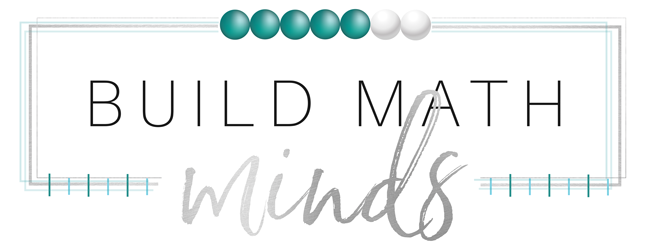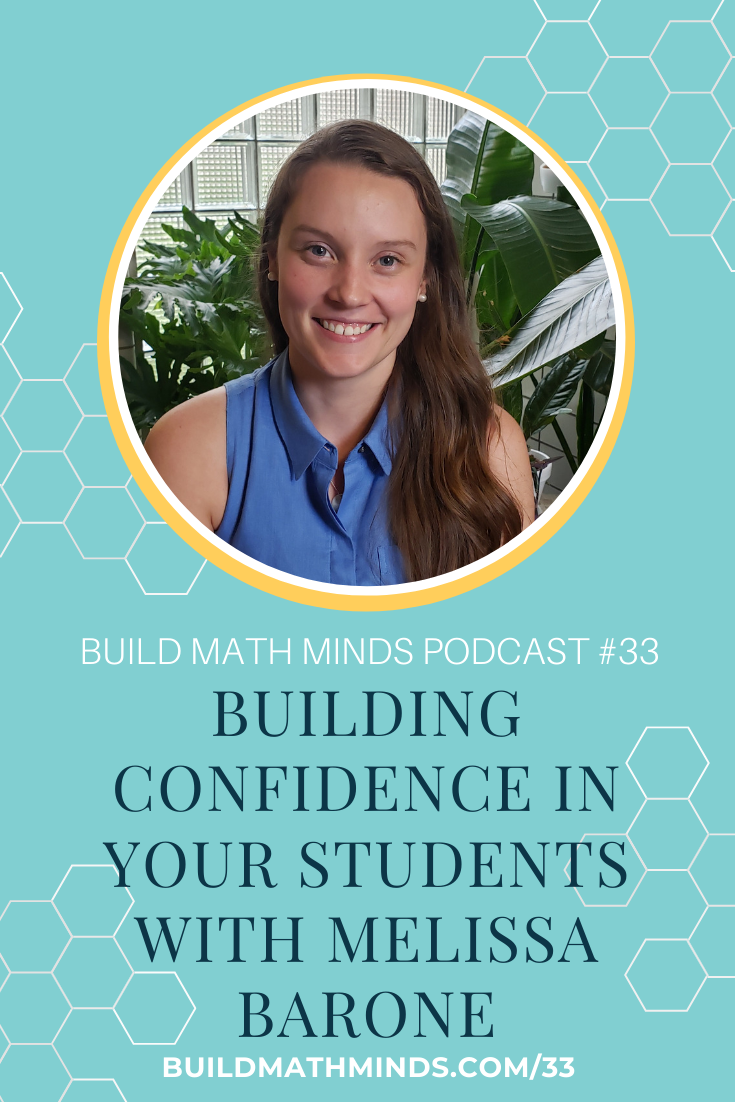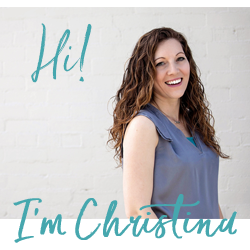Resources mentioned in this episode:
Number Sense 201: 3rd-5th grade course
Number Sense 101: PreK-2nd grade course
Northeastern Illinois program (MSTQE)
Number Talks books
Welcome, fellow Recovering Traditionalist to episode 33. Today, we are talking with Melissa Barone, a middle school teacher who makes me get emotional as she talks about how to build confidence in students and help them see that their voice matters in math.
Christina: This week is the last episode for a bit where I’m focusing on having you hear from real teachers out there who have made big changes in how they teach mathematics. All of these teachers have made a choice to put their students at the heart of the learning instead of the textbook. In this episode, I get to chat with Melissa Barone. Melissa took my Number Sense 201 course, which is actually for 3rd to 5th grade teachers, but she’s a middle school teacher. In this interview, she talks about how the things she learned from that course and other places have helped her transform her math classroom into a place where students are building their confidence in math and seeing that their voice matters in the math classroom.
Christina: Now, the Number Sense courses are now open for registration and you can get all the info at buildmathminds.com/enroll. But registration is closing, like in just a couple of days, so if you listen to this after the fact, you can go to that site and join the waitlist. Now here is my interview with Melissa.
Christina: In this episode. I am so excited to introduce you guys to Melissa Barone. So Melissa, to start off with, tell us a little bit about yourself and kind of your journey in education.
Melissa Barone: Sure. I am in my second year teaching and I teach at a K-8 independent progressive school. We do project-based learning and I integrate math through the projects that we create, but we also have a designated math class time as well throughout the week. During that time, I teach 6th grade math. When I started as an undergrad, I was exposed to inquiry-based teaching in preparation for being specifically a math teacher, and so I had some exposure to creating inquiry-based lessons and we were studying like Jo Boaler’s Mathematical Mind Stats, and looking at the NCTM’s 5 Practices for Orchestrating Productive Math Discussion.
Melissa Barone: Early on, like during my undergrad, I was looking into inquiry-based math teaching, but that was far different from what I experienced and my own educational experience. It was totally rote memorizing, and I was really good at that. Right? I could follow what the teacher told me and that I would repeat it over and over and over again. I remember even in high school I would be like a little teacher to my classmates just be like, “Oh this is the procedure.”
Melissa Barone: Then when I got to college, I ended up having to take not even college level math courses because I had no conceptual understanding. So there was two classes I had to take and pay for that weren’t at a college level because my conceptual understanding of math was so poor that I wouldn’t be able to test into like an appropriate math class. When I decided to become a math teacher and I was so fortunate that the professors I had were teaching us through conceptual in understanding and through inquiry-based learning, I fell in love with math and I’ve really shared that passion with my students today.
Christina: Okay, so first of all, we need to give a shout out to where you got your degree, because things are definitely changing. I’ve had a lot of these interviews where people are talking about like when we were in college, we didn’t learn this stuff, so where are you learning this stuff right now?
Melissa Barone: I went to Northeastern Illinois University, and that’s on the North Side of Chicago. I specifically took the, it’s called MSTQE is the program, and it’s Math and Science Teaching for Quality Education. It’s specifically for middle school math and science teachers. And so, it was an environment where I was in a cohort of the same kind of 10 to 12 students, and we were taking these math and science classes together and learning about the content, but then also figuring out how do we learn this content conceptually and really understand it, and then do that with our students. I got a good understanding, but I still feel like today, I’m continuing to develop my own conceptual understanding of math with my students now.
Christina: Absolutely. Yeah. As you start learning stuff, you realize there’s so much more to learn.
Melissa Barone: Absolutely.
Christina: I love that you see teaching now as it’s not only inquiry-based for the learners, but for you as a teacher. You get so much out of that.
Melissa Barone: Right. Yeah, so much out of it. I think it’s helped me form better relationships with my students as well, just because they see me as a learner too, and that’s just really important for them. Especially at the middle level where kind of a role as an authority, they’re going to want a question that and rebel against that anyway, so the fact that we see each other as learners in the classroom has been really positive for our relationships.
Christina: Oh my gosh, that’s so true. I taught middle school also and it is definitely that stage where they just want to like, “Well, just because you tell me to do something, I just want to do the opposite,” but instead if you are seeing yourself as a learner along with them, that is so powerful. I love how you stated that. I usually ask and you kind of talked about it, like what your teaching was like before you got professional development and after, how it’s changed. But really, like, your story was it all changed there when you were getting your degree. I’m going to jump kind of straight into can you tell a story about how this style of teaching has impacted your students?
Melissa Barone: Yeah, so when I think about this question, I think about one student in particular. I’m the 7th grade classroom teacher, but I teach 6th grade math. What I’ve really enjoyed about that position is that I teach 6th graders and then I have them in my classroom the following year as their 7th grade teacher. And so, this one student, I’ve kind of seen him struggle and grow because of the way that I teach math.
Melissa Barone: One thing that stands out is last year, so this student has dyslexia and dysgraphia, so he has tremendous learning challenges. They’re so severe that his current neuro psych, they said like, “Well, you know, kind of doing grade level math probably won’t occur, or he might not even be able to write for himself,” so it’s very severe. For him, what’s been important to me is how do I make sure he knows like what strengths he has. One of his strengths in particular is his visual understanding, his ability to identify patterns. And so when I told him last year that math is identifying patterns and generalizing them, I think that was really encouraging for him.
Melissa Barone: There was one experience that we did last year, we started the game Prime Climb. Have you heard of it?
Christina: Oh yeah. Yeah. Dan Finkel.
Melissa Barone: Of course. Prime climb was really cool and I learned about it last year just going through Twitter and all that stuff, which is the best resource, honestly. I showed the pattern of the prime climb board, like not the whole thing, but just like one through 20, and then I asked the class like, what do you notice and what do you wonder? This student, because of his deficits and I think because he’s able to acknowledge how this kind of identifies him as different than his peers, like he barely participates in group settings. But when he saw that pattern, he saw so much and he saw it so quickly that he was sharing more than any other students.
Melissa Barone: He was identifying things before other students. It was like grade level content, right? Like, he was identifying that like, “Oh, those two orange go together because 2 x 2 is 4” You know, like he was doing this math that he normally wouldn’t do or even talk about. I think it’s because it was visual and inquiry based. And so, I just remember him having that experience of like participating at that much in our was just like outstanding.
Melissa Barone: Then this year, I knew that that visual aspect of his learning was so strong. I wish more teachers would use visuals and really use like pattern recognition and pattern analysis as math class instead of thinking that math is like computation. So this year, I used, I think they were from the Number Sense 201 professional development where it’s that game where you show them the subitizing cards and then they group them into the multiplication facts and they … He can do addition, but it takes quite a while. Multiplication, he can identify now, this is what he has been working for like the past year and a half, is he can identify like okay, if you have 5 groups of 2, that’s 2 x 5 or 5 x 2. That’s like the level he’s working at.
Melissa Barone: I use the subitizing cards and I would flip them. Like, okay, I’d show him the card of what it said and then he would tell me how many there were just by looking at them. I started with just the basic ones like 1-7 so he could see what those images look like, so that when he saw them in groups he could be like, “Oh, that’s three groups of seven, that’s 21.” It was interesting, I started flipping the cards and I was going slower, and then there was at a point where he looked over at me and he’s like, “Ms. Barone, you can really just flip the cards faster than that. Like, come on.” He was actually doing multiplication facts that I don’t think I’ve ever seen from him before. I really feel like it’s because of those visuals and because he’s able to subitize so well.
Melissa Barone: So even after, so I was like quizzing him and then we finished. He was like, “Okay Ms. Barone, this is like too easy now.” He got so excited that he was like, “Can I go test other kids in the classroom?” To me, that was huge because one, yes, it was awesome that I was seeing his ability to like use multiplication and understand that. But then the other aspect is he wanted to show his grade level peers like, “I can do this.” I think that’s something he needs so much and something I value so much for him.
Melissa Barone: I just think like this type of teaching beyond like, yes, our students will have a conceptual understanding of mathematics, and they’ll do good on their ACTs and all those testing things, but really to me why I enjoy this type of teaching is because it builds their confidence and it lets them know that your voice matters and your strengths matter. That’s what I think about when I think about how this teaching has helped my students.
Christina: That is so powerful. We do, we get bogged down in all of the standards we need to teach and getting kids ready for testing. At the time of recording this, it is like testing season, and that’s like our number one focus. But really, it’s about building that confidence and belief in the students, and the power of my thinking is powerful. I don’t have to rely upon the teacher to tell me how to think. Yeah, that’s very true. Okay. To end this off then, what’s one thing that you would suggest teachers try if they’re wanting to make a change in their teaching?
Melissa Barone: One thing?
Christina: I know, there’s so many week could choose from, right? What do you think has been the most powerful for you as a teacher or for the students?
Melissa Barone: I think for me, it’s that I’m always willing to let my students know when I was wrong or when they made a mistake. I think the most I do that actually is with number talks, which I love. That’s another example of how you can kind of build students autonomy, and voice, and confidence through number talks. But whenever I identify that I have messed up, I feel like when I embrace it, then my students have become way more comfortable taking risks within the classroom.
Melissa Barone: Because they know that there’s not like anything at stake for being wrong, and that instead it’s like an opportunity for reflection and growth. That’s what I would say is just like don’t be afraid to let your students know when you’re wrong and that you’ve fumbled, because it’s important for them to see you modeling that so that they can take risks and be willing to be vulnerable in the classroom, and ask for support, and try out a problem that they may not normally try out. That’s one thing I think I could get to other teachers.
Christina: That’s an awesome, awesome suggestion and a powerful one when you put it into practice. Thank you very much, Melissa, for inspiring us through your story, and you gave us a lot of little nuggets to be able to take back and kind of keep and think about ways that we could make small changes in the classroom. Thank you very much for this.
Melissa Barone: Thank you. Yeah, great. And thank you for so much for what you’re doing. Like, the Number Sense 201 course was awesome. Like, the amount of resources. Then I shared it with other teachers in the building especially so we have a, like, she’s a special education consultant and she comes and works with the students one-on-one when we don’t have a chance to, and I gave her so many resources. It was just so valuable and I really appreciate the work you’re doing. And that I could take it online and at my pace was awesome. Thank you.
Christina: You are very welcome. I’m honored to be able to do that and have a way to be able to share it with people that I wouldn’t be able to get out and do professional development with normally.
Melissa Barone: Right. That’s great. Thank you.
Christina: Thank you, Melissa. Have a great day.
Melissa Barone: You too. Bye.
Christina: Bye.
Christina: These episodes are sponsored by the online trainings that I do for elementary educators. Each fall I open up my number sense courses. I have one for Pre-K to 2nd grade teacher’s called Number Sense 101 and one for 3rd through 5th grade teachers called Number Sense 201. These courses help you understand the foundation of number sense, how it impacts students’ ability to become fluent in mathematics and how to help your students build their number sense. Registration for the courses is now open for a limited time. Go to buildmathminds.com/enroll to learn more.
Subscribe and Review in iTunes
Hey, are you subscribed to the Build Math Minds Podcast, yet? If you’re not, make sure to do that today because I don’t want you to miss any episodes! Click here to subscribe to the podcast in iTunes.
While you’re there, don’t forget to leave a review on iTunes too. I would love to know your thoughts and how we can make sure that we give you content that you will really enjoy.
To leave a review, head over to iTunes and click on “Ratings and Reviews” and “Write a Review.” I can’t wait to hear your thoughts about the podcast.




